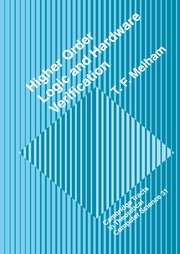4 - Abstraction
Published online by Cambridge University Press: 21 January 2010
Summary
The notion of abstraction plays a central role in making formal proof an effective method for dealing with the problem of hardware correctness. This chapter explains how two important types of abstraction—which will be referred to as abstraction within a model of hardware behaviour and abstraction between models of hardware behaviour—can be expressed in higher order logic.
Abstraction within a model has to do with the way in which the correctness of individual designs is formulated. With the approach to hardware verification introduced in the previous chapter, correctness is stated by a proposition which asserts that some relationship of ‘satisfaction’ holds between the model of a circuit design and a specification of its intended behaviour. This relationship must, in general, be one of abstraction—it must relate a detailed model of an actual design to a more abstract specification of required behaviour. Sections 4.1–4.6 show how this notion of correctness as an abstraction relationship can be formalized in logic and incorporated into the method of hardware verification already introduced.
The second type of abstraction, called abstraction between models, is discussed in section 4.7. Here the concern is not with the correctness of individual designs, but with the relationship between two different collections of specifications for the primitive components used in all designs. One such collection can be an abstraction of another in the sense that it presents a more abstract view of the same primitive components.
- Type
- Chapter
- Information
- Higher Order Logic and Hardware Verification , pp. 47 - 68Publisher: Cambridge University PressPrint publication year: 1993



